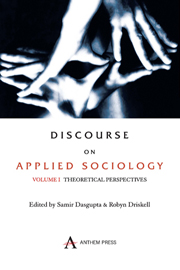Book contents
- Frontmatter
- Contents
- Preface and Acknowledgement
- Contributors to this Volume
- List of Abbreviations
- Introduction
- 1 Re-Orient World History, Social Theory and the Nineteenth Century
- 2 The Unique Complexity of Social Phenomena and the Uses of Social Science Knowledge
- 3 Unlimited Love, Compassion and Forgiveness: Acts of Moral Examplars
- 4 Theoretical Application
- 5 Applied Sociology's Need to Rethink the Tradition: Sociological Theorizing in a Global Framework
- 6 Social Analysis and Social Action
- 7 The Applied Sociologist as Craftsman
- 8 Applied Sociologists: Its Problems and Prospects
- 9 Sociology and its Application in Society: Giving Sociology its ‘Working’ Meaning
- 10 The Evolution of Sociology Back to its Applied Future
- 11 Contemporary Corporate Crime: Theoretical Perspectives, Cases & Consequences
- Index
2 - The Unique Complexity of Social Phenomena and the Uses of Social Science Knowledge
Published online by Cambridge University Press: 05 March 2012
- Frontmatter
- Contents
- Preface and Acknowledgement
- Contributors to this Volume
- List of Abbreviations
- Introduction
- 1 Re-Orient World History, Social Theory and the Nineteenth Century
- 2 The Unique Complexity of Social Phenomena and the Uses of Social Science Knowledge
- 3 Unlimited Love, Compassion and Forgiveness: Acts of Moral Examplars
- 4 Theoretical Application
- 5 Applied Sociology's Need to Rethink the Tradition: Sociological Theorizing in a Global Framework
- 6 Social Analysis and Social Action
- 7 The Applied Sociologist as Craftsman
- 8 Applied Sociologists: Its Problems and Prospects
- 9 Sociology and its Application in Society: Giving Sociology its ‘Working’ Meaning
- 10 The Evolution of Sociology Back to its Applied Future
- 11 Contemporary Corporate Crime: Theoretical Perspectives, Cases & Consequences
- Index
Summary
The assertion about the peculiarly intricate and complex character of social phenomena has, in much of social discourse, a virtually uncontested tradition. A significant part of the premise about the complexity of social phenomena is the conviction that it complicates, perhaps even inhibits the development and application of social scientific knowledge. Our paper explores the origins, the basis and the consequences of this assertion and asks in particular whether the classic complexity assertion still deserves to be invoked in analyses that ask about the production and the utilization of social scientific knowledge in modern society. We refer to one of the most prominent and politically influential social scientific theories, John Maynard Keynes' economic theory as an illustration. We conclude that, the practical value of social scientific knowledge is not necessarily dependent on a faithful, in the sense of complete, representation of (complex) social reality. Practical knowledge is context sensitive if not project bound. Social scientific knowledge that wants to optimize its practicality has to attend and attach itself to elements of practical social situations that can be altered or are actionable by relevant actors.
This chapter represents an effort to re-examine the relation between social reality, social scientific knowledge and its practical application. There is a widely accepted view about the potential social utility of social scientific knowledge that invokes the peculiar complexity of social reality as an impediment to good theoretical comprehension and hence to its applicability.
- Type
- Chapter
- Information
- Discourse on Applied SociologyTheoretical Perspectives, pp. 79 - 98Publisher: Anthem PressPrint publication year: 2007



